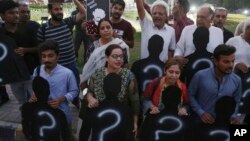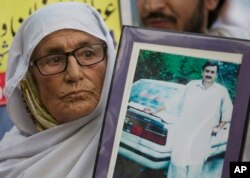Human rights defenders in Pakistan joined relatives of missing loved ones Thursday to demand the government take stronger action to stop enforced disappearances. Nationwide protests took place on the International Day of the Victims of Enforced Disappearances.
Thousands of people have disappeared over the years in Pakistan. And according to human rights organizations, some missing people have been found dead, their bodies bearing signs of torture.
Pakistan's Commission of Inquiry on Enforced Disappearances, or CoIoED, reports that through June of this year, there were 5,213 missing person cases and of that number, 2,000 remained unsolved. The number of enforced disappearances, however, is commonly believed to be underreported.
Human rights activist I. A. Rehman, in a column in the country's longest- running English daily newspaper, Dawn, asked the newly-elected government of Prime Minister Imran Khan to review the issue, starting with an acknowledgment that "enforced disappearances are still being reported in significant numbers."
Activists blame a majority of the disappearances on intelligence agencies, particularly the ones linked to Pakistan's powerful military establishment.
Last year, five bloggers disappeared and later reappeared after a national and international uproar. One of the bloggers, Waqass Goraya, who ran a Facebook page critical of Pakistan's military, later told the BBC he was abducted and tortured by a state institution with "links to the military." Goraya now lives in the Netherlands.
In 2017, Pakistan's Senate Functional Committee on Human Rights held law enforcement agencies responsible for the disappearances.
However, in a briefing to the committee this week, the chairman of the CoIoED, retired Justice Javed Iqbal, said the issue had been blown out of proportion by international non-governmental organizations to defame Pakistan.
"In many cases, the people still missing are living abroad, such as associates of Mangal Bagh, Brahamdagh Bugti and Sufi Muhammad," he said, naming individuals who are wanted in Pakistan for their connection to either a nationalist insurgency or religiously motivated violence.
Rights activist Marvi Sirmed said the government has failed to take action to resolve the issue. Her comments were published Thursday in the Daily Times, an English language newspaper.
"Despite the large number of disappearances' coming to light, not a single person has been held to account for perpetrating such heinous actions," she wrote.
Earlier this week, a committee on human rights in Pakistan's Senate recommended drafting a bill to criminalize enforced disappearances.
In 2010, the United Nations General Assembly declared August 30 the International Day of the Victims of Enforced Disappearances due to "its deep concern about the increase in enforced or involuntary disappearances in various regions of the world," according to the U.N.'s website.
The international agency voiced alarm that the practice of enforced disappearances, once a hallmark of oppressive dictatorships, had become a global problem.

